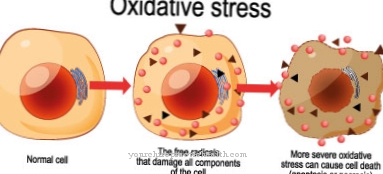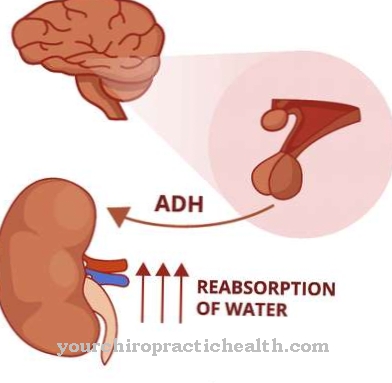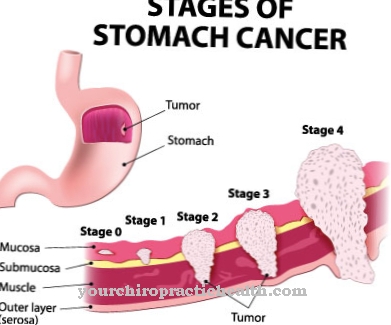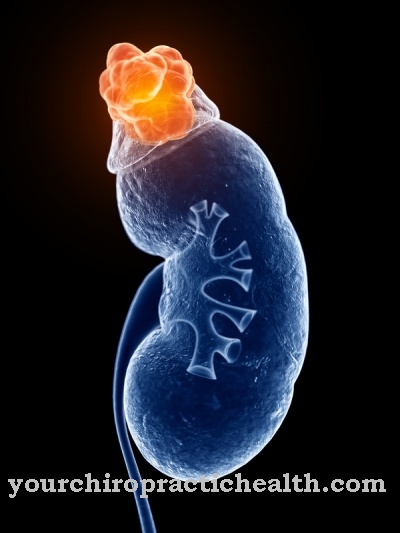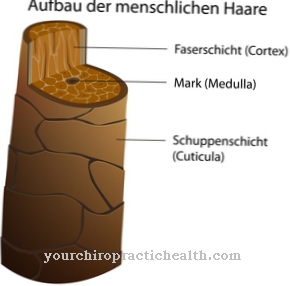At Prostate cancer or Prostate cancer it is a tumor disease of the male prostate gland. It is one of the most common types of cancer in men and can usually be treated well if detected early.
What is prostate cancer?
.jpg)
The prostate, also called the prostate gland, is a gland that belongs to the reproductive organs of men. It is roughly the size of a walnut and the shape of a chestnut and is located below the urinary bladder in front of the rectum.
The prostate is largely made up of connective tissue and muscles and produces some of the fluid that is expelled during ejaculation. Prostate carcinomas usually develop in the outer area of the gland and are the most common type of cancer in men.
Prostate cancer usually occurs in older men over the age of seventy, but it can also be diagnosed in younger men. However, enlargement of the prostate is not always prostate cancer - benign tumors and harmless inflammation of the prostate are also common.
causes
Prostate cancer arises due to a combination of different risk factors. Heredity is a significant factor that can lead to this condition. If a family member has already had prostate cancer, the probability is about twice as high that you will develop prostate cancer yourself.
Another risk factor for prostate cancer is age. Prostate cancer occurs less often in men under the age of fifty than in men who have already exceeded this limit. Diet and general lifestyle can also trigger prostate cancer onset.
Men who eat high-fat and low-fiber diets are more at risk than those who eat a lot of vegetables and fruits. This suggests that a high body mass index is a particular risk factor for prostate cancer.
Symptoms, ailments & signs
In most cases, there are no prominent symptoms at first. The first signs are usually only noticed when the tumor in the prostate (prostate gland) has reached a certain size. However, these are often not very characteristic.
In advanced disease, urination problems (micturition disorders) are the most common, as the urethra is narrowed by the tumor and the urine flow is blocked. This usually includes delayed urination, urinary retention (inability to urinate), or increased dripping. Often, residual urine remains in the bladder after micturition.
This is accompanied by a general increased need to urinate, which occurs especially at night. Occasionally there are abnormalities in the urine stream. This can be very weak or interrupted frequently. Erectile dysfunction, painful ejaculations, and low ejaculations can also occur. Sometimes pain in the genital area occurs with nerve damage.
Some people have difficulty emptying their bowels. There may be visible blood in the urine or seminal fluid. A number of general symptoms of cancer can also occur. These include fever, night sweats, poor performance, general exhaustion and tiredness, weight loss or anemia. If metastases have already formed in the bones, severe pain occurs in the lower back, pelvis, or hips.
Diagnosis & course
Prostate cancer is recognized in many cases in the course of a preventive check-up, as there is no pain and hardly any discomfort in the early stages of the disease. Symptoms that can still indicate prostate cancer include problems urinating, defecation disorders, unexplained weight loss, blood in the urine, and bone pain.
However, those affected usually only become aware of symptoms of this type when the prostate cancer has already metastasized. The most common examination of the prostate is the digital, rectal examination - here the doctor scans the prostate through the wall of the rectum and assesses the size, shape and texture of the prostate gland.
The PSA test, in which the protein molecule of the prostate-specific antigen is released, can also provide information about prostate cancer. Other diagnostic methods are tissue sampling, ultrasound examinations and computed tomography.
Complications
Prostate cancer that is detected too late can seriously impair bladder function if it progresses. Possible complications are overactivity of the bladder with a constant urge to urinate, occasional involuntary leakage of urine, or complete incontinence. If the tumor damages the nerves in the vicinity of the prostate, erectile dysfunction occurs.
In the advanced stages, prostate cancer often forms daughter tumors (metastases) in the lymph nodes and bones, especially in the pelvis, thighs, ribs and back. Bone metastases are very painful and often result in broken bones. Metastatic prostate cancer is usually treated with radiation or chemotherapy; possible side effects include inflammation of the bladder and rectum, nausea, vomiting, diarrhea, hair loss and an increased susceptibility to infections.
Hormone therapy is often associated with a reduction in bone density, hot flashes and erectile dysfunction; in the long term, the risk of metabolic disorders and cardiovascular diseases increases. Complete surgical removal of the prostate can result in temporary or long-term urinary incontinence and a narrowing of the bladder outlet, making urination difficult.
Damage to certain nerve cords during the operation causes the loss of erectile function. If prostate cancer is left untreated or if treatment starts too late, daughter tumors can spread in the body and ultimately cause death.
When should you go to the doctor?
Men who experience irregularities or changes in libido should get examined. If there are any abnormalities when using the toilet, peculiarities when urinating or a general malaise, a doctor is required. Swelling, tightness in the abdomen or pain indicate a health impairment. A doctor's visit is necessary as soon as the symptoms persist or increase.
Erectile disorders, pain during ejaculation or loss of urinary control should be examined and treated. If pain spreads through the genital area into the back, there is an acute need for action. In these cases the disease is already at an advanced stage. Since prostate cancer leads to premature death if left untreated, a check-up visit to a doctor is indicated as soon as the first abnormalities appear. In addition, men should generally take part in regular cancer screening examinations so that early detection of the disease is possible.
A decrease in body weight, exhaustion, fatigue or fatigue quickly are signs of an existing illness. A doctor is required if unusual night sweats form, reduced physical performance or bleeding occurs. A pale complexion, an internal weakness or listlessness are further indications of a health disorder. If you experience problems with defecating, you should consult a doctor as soon as possible.
Treatment & Therapy
Prostate cancer can be treated in a wide variety of ways, with the selected therapy depending on the stage of the disease, the age and general state of health of the person affected, as well as the rate of growth of the tumor. The treatment can consist of one or more therapeutic approaches.
One method of treatment for prostate cancer is radiation therapy, but there are two different types of therapy. On the one hand, the patient can be irradiated from the outside and, on the other hand, irradiation through radiation source implants can be used, in which the affected person is implanted with small radiation sources that act directly on the tissue of the prostate.
Other methods that are used in the treatment of prostate cancer are hormone therapies, in which testosterone is withdrawn from the body, operations in which the carcinoma can be completely removed in the early stages, immunotherapies and chemotherapy. The success of the treatment is all the more likely if the prostate cancer was discovered early.
You can find your medication here
➔ Medicines for bladder and urinary tract healthprevention
Prostate cancer is a disease that can only be prevented to a limited extent. However, it is important to lead a healthy life with plenty of exercise and a healthy diet. You should also pay attention to a normal body weight and take countermeasures if the body mass index is higher than 30. In addition, men should go to a check-up from the age of 50 at the latest. Men who have had cases of prostate cancer in their families should even start screening earlier so that prostate cancer can be diagnosed at an early stage.
Aftercare
Once the treatment of the disease caused by prostate cancer is over, it is usually not possible for the patient to organize and live normal everyday life. Physical and psychological impairments are often very stressful for the patient. Therefore, after the patient's prostate cancer treatment is completed, follow-up care is provided.
It begins about a quarter of a year after the end of treatment. The patient should be examined regularly by the treating urologist. This is the only way to recognize the recurrence of the cancer early enough to intervene early with appropriate treatment. During the follow-up examinations, determining the PSA level is of great importance.
If this value is harmless, further investigations are not necessary. In addition, it is necessary to recognize and treat the side effects and side effects of the treatment as part of the aftercare. For example, there may be a risk of thrombosis or long-term defects in urination.
Furthermore, psychological, physical and social problems are caught and treated through aftercare. The aftercare treatments aim to accompany and support the patient as well as possible on their way back to normal life. If necessary, the patient is of working age for which optimal earning capacity should be restored.
You can do that yourself
Prostate cancer is a serious condition that needs treatment by a medical team. Nevertheless, those affected can take some measures to alleviate the symptoms and promote recovery.
First of all, rest and be careful. During or after the treatment, the body is severely weakened and must not be subjected to stress, sport or strenuous physical work. A suitable diet and compliance with the suggested hygiene measures also support healing and prevent any complications such as chronic fatigue, bleeding or wound healing disorders.
Patients should also go over the medication they are currently taking with their doctor. Certain preparations have a dehydrating effect or influence the bladder muscles and must therefore be avoided. Anyone who regularly takes diuretics, antidepressants, antiallergics, Parkinson's medication or anticonvulsants should inform the doctor about this. The doctor can clarify the risks and point out possible alternatives.
In consultation with the doctor, various homeopathic remedies can also be tried. These include pumpkin seeds, nettle root and sawtooth palm as well as various extracts and ointments made from medicinal herbs. If side effects occur after taking these preparations, the family doctor must be informed.

.jpg)
